Lawyer Limelight: Thomas Patrick Lane
By Katrina Dewey | February 18, 2018 | Lawyer Limelights, News & Features
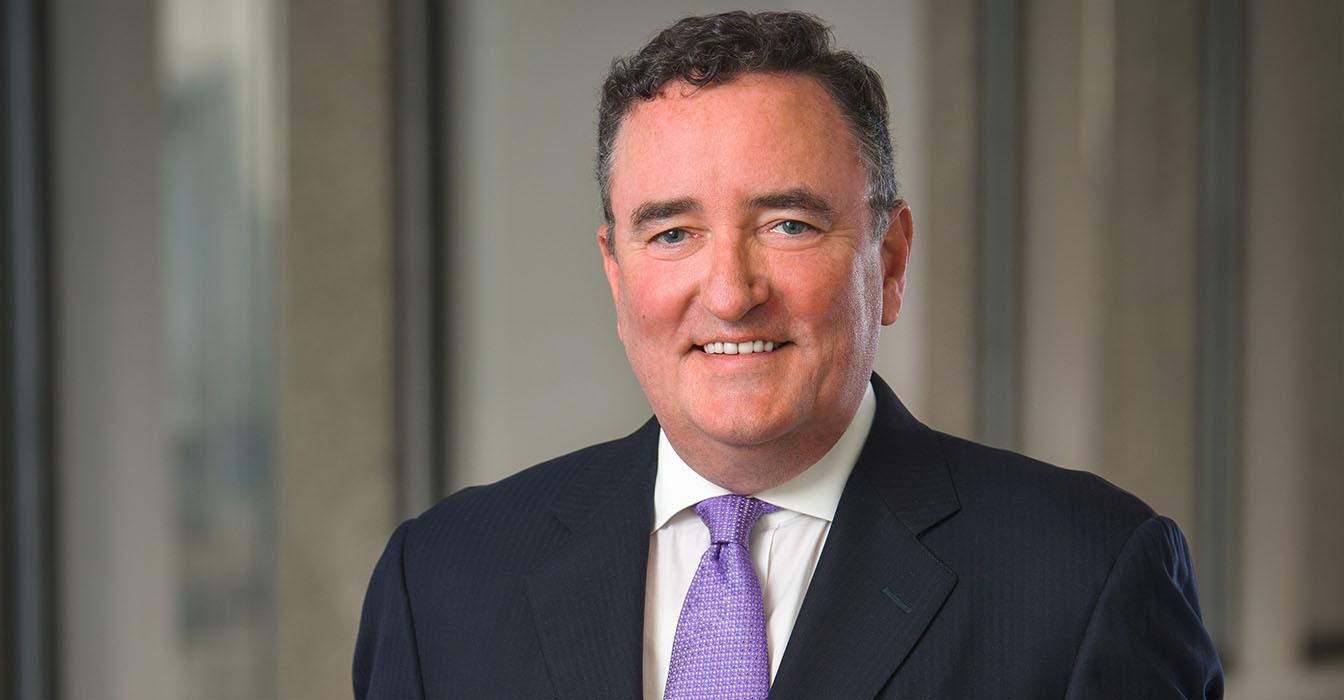
Photo by Dave Cross.
Every once in a while, you meet a lawyer who doesn’t just give lawyers a good name, he does people as well.
That’s the case with Winston & Strawn partner Thomas Patrick Lane, who has one of the most fascinating digital media and IP practices around. The firm’s co-head of IP, the bi-coastal Lane started life as a prosecutor, which turned out to be just the experience called for when Prince (or more precisely one of his associates) had need of a criminal lawyer back in 1996. Lane has never looked back, trying the first Internet music case to a jury and the first Digital Millennium Copyright Act safe harbor case to a jury.
He’s also the only lawyer in mankind to appear on Broadway in Kinky Boots – wearing the boots! – and throw out the opening pitch at Fenway Park, coached by Pedro Martinez. Bucket list? You bet, but that’s also living the dream for this extraordinarily politically engaged and active public interest lawyer who works as hard for the LGBTQ community and encouraging law firm diversity as he does raising money for a wide range of causes near and dear to his heart.
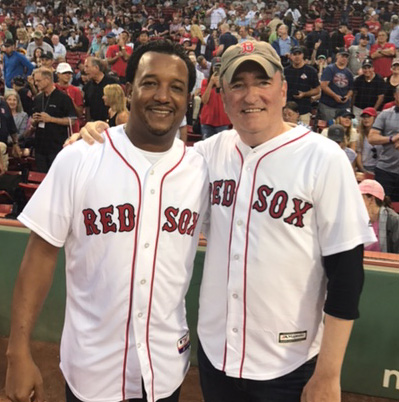
Lawdragon: Tom, can you tell us a bit about your path to becoming a lawyer? What was your early role model of a lawyer? And how did you choose Tulane, and your first jobs?
Thomas Patrick Lane: One of my earliest memories – I was probably about 6 - was sitting directly in front of our giant black and white TV watching, of all things, the Watergate hearings. Of course, largely I didn’t understand any of it, but I loved the questioning and the seriousness of purpose.
From that point, I knew I wanted to be either a lawyer or an unimpeached president.
For undergrad, I went to Hamilton, in upstate N.Y. An incredible school, but I knew for law school I wanted to experience a larger university in a diverse environment. Tulane, with a lot of great clinical programs, and New Orleans, perfectly fit the bill. Mardi Gras, in which I’ve been riding for over a decade, didn’t hurt Tulane’s pitch.
How did I became a prosecutor? I was a summer associate at an old-line New York/D.C. corporate firm. It was in the midst of the early ‘90’s recession, and I was fortunate enough to get one of two litigation offers in a class of 19. I turned it down. I wanted to serve the public, and to be in a courtroom trying cases.
I spent five years as a prosecutor, serving communities in the highest crime areas in New York, during a period of time when we were experiencing thousands upon thousands of homicides a year. But there was a point, when my witnesses one day would be my victims the next, and when I became a bit immune to reacting to autopsy or crime scene photos. Then I knew I was ready for a new challenge – and I returned to the firm I left.
LD: If you obviously could have gone down the transactional or corporate route, why did you choose litigation?
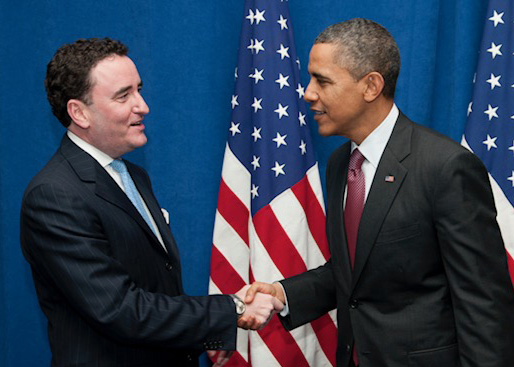
TPL: I chose litigation because I was born a fighter. I don’t say that lightly, I say it literally.
I was born over two months premature. I fought for life then, and I fight now.
I’m an Irish Catholic adopted kid, and have experienced hemophilia and homophobia my whole life. Neither concept is simple. I played baseball against every wish of my parents and doctors because I wanted and needed to be in the game, bruising and bleeding denied. But I did it, and loved it. The same is true with litigation.
And that’s why diversity in the law, and in law firms needs to exist. We cannot know what our clients experience in their own story; we just must be open and accepting to all stories. Look at people and imagine their worst day, their worst client, their worst employee. Then express compassion. And make that important. Make that your focus. Make that vital. Because those stories are. We do not exist without our clients, and we should not.
LD: How did you gravitate to intellectual property, and what do you enjoy about representing new media companies?
TPL: An unusual path to be sure, from homicide to copyright. I returned to Reid & Priest in January, 1996. We had a partner join a few months later with a very significant and fascinating entertainment practice, Michael Elkin, who is now Winston’s vice-chairman. One day he walked into my office and said “I understand you have some criminal experience.” I responded “well, I’ve never been arrested but I have put a lot of people in jail.” The matter involved an employee of a brilliant musician who was then known as TAFKAP (the artist formerly known as Prince). That matter turned into a fusillade of additional entertainment and IP matters.
The most exciting and enjoyable thing about representing new media companies is how fluid and creative they are – and having to advise in that realm as the law struggles to catch up. Having tried the first internet music case to a jury, and the first DMCA safe harbor case to a jury, not to mention the circuit appeals, it’s been an extraordinarily exciting space to be in. And no doubt it will continue to be.
LD: You are from the Boston area and recently threw out the opening pitch at Fenway Park – in a Red Sox-Yankees contest! How did that happen? How did it go, and did Pedro Martinez coach you?
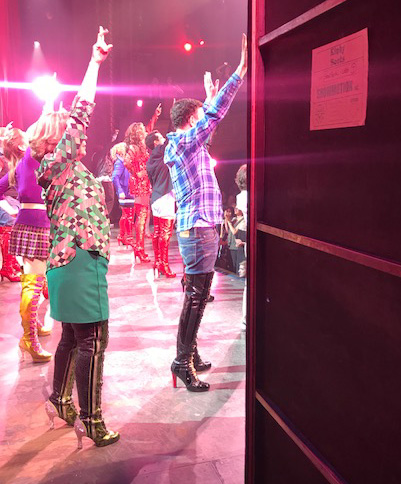
TPL: I was born in Boston, and as a kid I had four posters in my room: (a) an old RFK campaign poster; (b) Farrah Fawcett blue (no idea); and (c) one each of Carl Yastrzemski and Jim Rice. Today it would be Big Papi and Pedro Martinez.
The opening pitch came about because I’ve been involved in the Pedro Martinez charity, serving children and education in the Caribbean. As a result, I had the opportunity to throw out the first pitch against the Yankees (with him judging from directly behind me). He told me to throw high: I threw low. I wouldn’t exactly call it a strike – but Sandy Leon, the catcher, didn’t need to move. So that counts.
LD: You are very involved in politics. Where did that involvement begin, and what inspires it? Who are some of the politicians and candidates you admire and why?
TPL: Growing up Irish-Catholic in Massachusetts, politics was discussed far more than religion at the supper table. And I saw in politics a way to support and advocate for progress. I spent time placing lawn signs in New Hampshire, and driving a bus in Iowa getting older voters to the polls.
But certainly my most formative experience was working for Senator Ted Kennedy in Washington. Folks could disagree with him for a variety of reasons, but he was one of the most successful legislators in our history in reaching across the aisle. Politics and law always intersect, but no more so than the day both William Rehnquist and Antonin Scalia walked into the office together while I was manning the front desk. “Do you guys have an appointment?” Ha.
LD: You are also very involved in LGBTQ issues. What is important for the legal profession to understand about LGBTQ diversity, and what role do you play as a leading partner at a major firm who speaks out?
TPL: More and more often, as LGBTQ awareness increases, clients make it a fundamental part of any RFP or pitch. And that makes complete sense. Clients want their lawyers to reflect their workplace and their marketplace. It’s vital for lawyers and folks in the administration of firms to understand this. It is a process of education and hopefully enlightenment.
Coming out at a major law firm isn’t easy. Coming out at a smaller firm can be even more difficult. The message straight and LGBTQ leaders in law firms need to send is not just one of acceptance – it is one of encouragement. That you are important and vital to our success. That’s my message.
LD: And, of course, there is the fabulous “Kinky Boots”! How did you become involved with the production, how many times have you seen it, and what’s your favorite song?
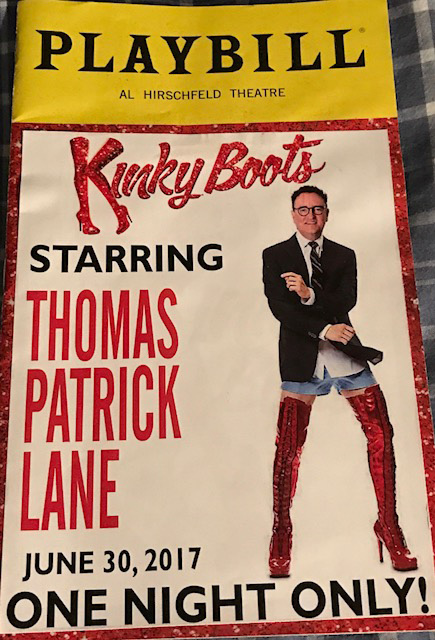
TPL: Ah, Kinky Boots. I initially read the book and score and was immediately touched by the words, the story, the music. Cyndi Lauper was a fundamental part of my high school prom, for the better...she’s just such an incredible talent in all respects. I haven’t the slightest idea how many times I’ve seen it but I can identify the cities: New York, Boston, London, Toronto, Melbourne, Sydney, Los Angeles...and to a town near you soon!
As for my favorite song: At times “The History of Wrong Guys,” which always brings laughter, but more often than not I’d go with the finale of “Just Be,” which always brings the crowd to its feet and has got such a positive message of inclusion and acceptance.
LD: Tell us about wearing the boots! You appeared on stage earlier this year – almost certainly the only lawyer to throw out the opening pitch at a Red Sox game and wear the boots in New York and Australia in the same few months. Your appearance raised funds for True Colors shelter for LGBTQ kids in New York. I know you are also involved in other important groups, including the Tyler Clementi foundation. What’s meaningful to you about being involved in these groups?
TPL: The damn boots are hard. I did wear them on stage in New York for a few choice hours, and again at the Australian equivalent of the Tony Awards. It takes a recovery period of weeks, and any man who doesn’t respect folks who regularly walk in those heels is lost.
I try to combine my social activities with charitable endeavors. With Kinky Boots, we raised money for the Theatre Development Fund and True Colors Shelter. With the Sox, for the Pedro Martinez charity. With Winston’s pro bono efforts for Tyler Clementi and the Legal Aid Society, we are hopeful to continue to do great work.
As lawyers, we frequently forget how truly blessed we are. Blessed not only by our friends and our loved ones, but by our skills and status. We always need to remember not only to use those skills for those who can afford experienced legal talent, but also to make sure that our success can be used to aid the success and survival of those among us who cannot afford big law.
LD: You’ve also spent time in a director’s chair. What’s the story?
TPL: Well, there’s the confluence between the law and creativity. The law can be a rigid, yet at times undefined, field. Both allow for expression in very different ways. The law should hopefully protect, just as the creative arts should hopefully inspire. I’ve had a small production company, focused largely upon independent films, with an LGBTQ focus. Sitting in the chair is always a rush, but never better than being in a courtroom.

